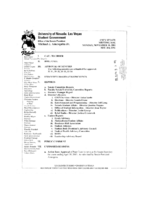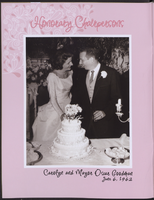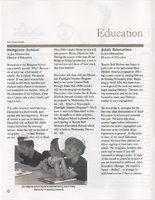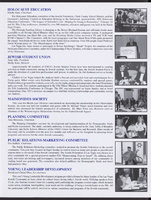Search the Special Collections and Archives Portal
Search Results
University of Nevada, Las Vegas Solar Decathlon Records
Identifier
Abstract
The University of Nevada, Las Vegas Solar Decathlon Records (2013-2021) are comprised of records documenting the University of Nevada, Las Vegas's participation in the U.S. Department of Energy (DOE) Solar Decathlon collegiate competition. The collection includes records created by the 2013, 2017, and 2020 UNLV teams (Team Las Vegas) in designing and building their respective competition entries: DesertSol, Sinatra Living, and Mojave Bloom. Records include competition application files, working project files, As-Built submittal packets, and promotional and marketing files for the competition. The majority of records in this collection represent the 2017 competition. Archived websites and social media accounts associated with Team Las Vegas and the Solar Decathlon competition are also included in the collection. The records document Team Las Vegas's efforts in designing and building energy efficient homes for the Solar Decathlon competition.
Archival Collection
Levy Family Papers
Identifier
Abstract
Collection is comprised of scrapbooks, photographs, awards and certificates, and ephemera mainly dating from approximately the 1950s to 1970s gathered by the Levy family of Las Vegas, Nevada. This collection documents the personal and professional lives of three generations in the Levy family: Harry C. Levy, Al Levy, and Andrew “Drew” Levy. Materials in this collection also include photographs and clippings about the Levy Realty Company and about the various public positions held by Harry C. Levy, such as Las Vegas city commissioner.
Archival Collection
Thomas Hickey Political Papers
Identifier
Abstract
The Thomas Hickey Political Papers (1964-1996) contain the professional files of Hickey’s career as a Nevada State Assemblyman and Senator. Materials include constituent correspondence, voting records, memoranda, newspaper clippings, bills, and research documentation on topics such as the Yucca Mountain Nuclear Waste Repository, the Equal Rights Amendment (ERA), education, health, prisons, finance, and Nevada infrastructure. The collection highlights Hickey’s role on committees including finance, transportation, government affairs, and ways and means.
Archival Collection
Bob Paluzzi Panoramic Photographs
Identifier
Abstract
The Bob Paluzzi Panoramic Photographs (1978-2005) contain the work of photographer Robert "Bob" Paluzzi. Paluzzi began documenting local events and locations in Las Vegas, Nevada during the mid-1970s and continued photographing locations across the United States and internationally until 2005. The collection contains original photographic negatives (black-and-white and color) and photographic prints that depict sporting events and places throughout Las Vegas and the surrounding region. Additional locations include cities across the United States, and international locations including Paris, France; Brussels, Belgium; and London, England. A number of the images are from major sporting events that took place outside Las Vegas, such as Super Bowls XIV to XXXIX and Major League Baseball World Series games.
Archival Collection
Ronzone Family Papers
Identifier
Abstract
Ronzone Family Papers (1900-1991) include newspaper clippings, business documents, correspondence, certificates, yearbooks, publications, artifacts, and photographs. The papers document their lives in Nevada, their department store, and Dick Ronzone's involvement in local politics.
Archival Collection

Meeting minutes for Consolidated Student Senate, University of Nevada, Las Vegas, November 10, 2004
Date
Archival Collection
Description
Text

Program for The Wedding event at Temple Beth Sholom, June 6, 2010
Date
Archival Collection
Description
Booklet for the Wedding celebrations and vow renewals of couples at Temple Beth Sholom.
Text

Brandon Snook oral history interview: transcript
Date
Archival Collection
Description
Oral history interview with Brandon Snook conducted by Barbara Tabach on March 14, 2018 for the Remembering 1 October Oral History Project. In this interview, Colonel Brandon Snook describes his military career as a trauma surgeon and his job at Nellis Air Force Base in Las Vegas, Nevada, where he has been stationed since 2004. He shares details about Sustained Medical and Readiness Trained (SMART), a program that brings physicians, nurses, and technicians from the around the world to the University Medical Center of Southern Nevada (UMC) for intensive medical training. Snook also discusses the night of the October 1, 2017 mass shooting when he and others from Nellis were called in to UMC to treat the injured.
Text


